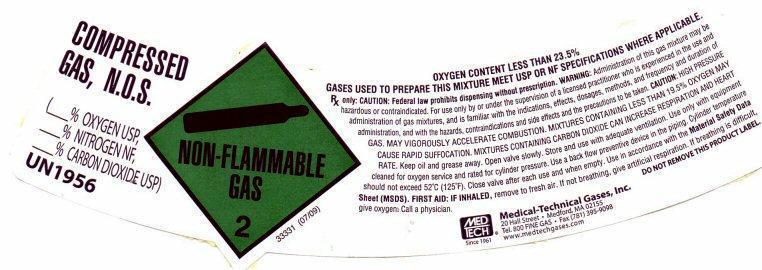
Compressed Gas N.o.s. | Oxygen, Nitrogen, Carbon Dioxide Gas while Breastfeeding
Can I continue breastfeeding if I am using Compressed Gas N.o.s. | Oxygen, Nitrogen, Carbon Dioxide Gas? How long does it stays in breast milk?
Compressed Gas N.o.s. | Oxygen, Nitrogen, Carbon Dioxide Gas Breastfeeding Analsys
Nitrogen while Breastfeeding
CAS Number: 7727-37-9; 17778-88-
No information is available on the clinical use of liquid nitrogen on the skin during breastfeeding. Because it is a nontoxic gas that is unlikely to appear in breastmilk or be absorbed by the infant, it is considered safe to use during breastfeeding. No special precautions are required.
Compressed Gas N.o.s. | Oxygen, Nitrogen, Carbon Dioxide Gas Breastfeeding Analsys - 2
Oxygen and Breastfeeding
SafeOxygen is essential for life. It is considered safe to breast feed while using supplemental oxygen or Hyperbaric oxygen therapy.
Nitrogen and Breastfeeding
SafeWhat should I do if already breastfed my kid after using Compressed Gas N.o.s. | Oxygen, Nitrogen, Carbon Dioxide Gas?
Not much study has been done on safety of Compressed Gas N.o.s. | Oxygen, Nitrogen, Carbon Dioxide Gas in breastfeeding and its ingredients. Even we do not have complete information about usage of Compressed Gas N.o.s. | Oxygen, Nitrogen, Carbon Dioxide Gas in breastfeeding so at this point a trained medical professional could be your best bet. If you observe anything abnormal with your baby please contact 911.
My health care provider has asked me to use Compressed Gas N.o.s. | Oxygen, Nitrogen, Carbon Dioxide Gas, what to do?
If your doctor considers Compressed Gas N.o.s. | Oxygen, Nitrogen, Carbon Dioxide Gas safe enough to prescribe for you that means its benefits should outweigh its known risks for you.
If I am using Compressed Gas N.o.s. | Oxygen, Nitrogen, Carbon Dioxide Gas, will my baby need extra monitoring?
We are not Sure, Please check with your healthcare provider or doctor.
Who can I talk to if I have questions about usage of Compressed Gas N.o.s. | Oxygen, Nitrogen, Carbon Dioxide Gas in breastfeeding?
US
National Womens Health and Breastfeeding Helpline: 800-994-9662 (TDD 888-220-5446) 9 a.m. and 6 p.m. ET, Monday through Friday
UK
National Breastfeeding Helpline: 0300-100-0212 9.30am to 9.30pm, daily
Association of Breastfeeding Mothers: 0300-330-5453
La Leche League: 0345-120-2918
The Breastfeeding Network supporter line in Bengali and Sylheti: 0300-456-2421
National Childbirth Trust (NCT): 0300-330-0700
Australia
National Breastfeeding Helpline: 1800-686-268 24 hours a day, 7 days a week
Canada
Telehealth Ontario for breastfeeding: 1-866-797-0000 24 hours a day, 7 days a week
